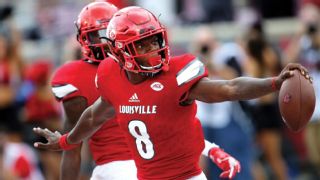|
Deshaun Watson celebrated a national championship delivered largely on his shoulders, and in the immediate aftermath, buzz picked up around one question: Did voters have any Heisman remorse? Watson finished his season with a flourish and a ring (not to mention two additional games); Heisman winner Lamar Jackson ended his season largely on his back. But asking about remorse ignores the Herculean effort it took for Jackson to win the Heisman in the first place. Watson had a spectacular supporting cast, including an offensive line that ranked among the better groups in the ACC. Jackson had … well, he had an offensive line that regressed as the season progressed, and that hindered his ability to turn the routine play into the spectacular.  That Jackson ran for more than 1,500 yards, threw for more than 3,000 yards and accounted for 51 total touchdowns behind an offensive line that allowed 47 sacks should underscore why he deserved to win. As one coach who faced Jackson last season said, "Lamar is a good enough athlete" to overcome the limitations with his lead blockers. That Jackson ran for more than 1,500 yards, threw for more than 3,000 yards and accounted for 51 total touchdowns behind an offensive line that allowed 47 sacks should underscore why he deserved to win. As one coach who faced Jackson last season said, "Lamar is a good enough athlete" to overcome the limitations with his lead blockers.
But he could not overcome them entirely. And that is why Jackson and Louisville have their own questions to answer this offseason. Debating "would haves" and "should haves" is not constructive; but looking at what happened to Louisville and Jackson in the final three games is -- especially since Jackson returns with much more to prove. First, though, a little background. Louisville has had issues along its offensive line for years. In his first two seasons as head coach, Bobby Petrino saw his line allow 82 combined sacks. In July, Petrino said he expected the line to be “a lot better.” At the outset, the line was better, but not consistent. Performances like the one against Florida State were matched with performances like the one against Virginia. Nine games into the season, the bottom fell out. Louisville allowed 11 sacks in a crushing loss to Houston, and most everybody on the field looked dazed and confused. A similar scene unfolded in the Buffalo Wild Wings Citrus Bowl against LSU a month later. Jackson was sacked eight times, and the offensive line was swamped by an aggressive, ticked off defense eager to shut down the Heisman winner. LSU also had additional time to prepare for Jackson, and this is where there should be concern as the next season dawns: The Tigers knew exactly what Jackson would do at every single turn. And they knew how the offensive line would block them at every turn. Jackson was no longer a novelty act and with a full season on tape, LSU studied diligently. “We watched a lot of film and every time they motioned out of the Pistol … we knew what was coming,” bragged defensive tackle Davon Godchaux. “We knew the guard was going to pull, the three-technique would get a double-team, the nose would get a back block. We knew everything. We knew what they were going to do.” Predictability plagued Louisville through parts of last season, and a replay began all over again. In his final three games, Jackson was sacked 22 times. “The defense was just being good,” Jackson said. “They were working hard. We just had to step up, and we didn't. That's all I have to say about that.” Louisville also wore down as the season went on thanks to strenuous practices that took their toll. Increasing expectations hurt, too, as Louisville went from relative unknown to serious playoff contender. Petrino blamed himself. “There's a saying out there that says one of the greatest obstacles to being great is being good,” Petrino said. “I saw us not working and practicing and having the same intensity that we needed in the last three games. We got to do a better job and we're certainly going to spend a lot of time evaluating and trying to do the best we can to never see it happen again.” In three seasons, Louisville has allowed 129 total sacks. Something had to be done, so Petrino went back to friend Mike Summers, who coached some of the best offensive lines Louisville has ever produced during Petrino’s first stint with the Cards. Summers comes from Florida, where he worked wonders with a depleted offensive line, turning a weakness into a strength. But all the blame should not go to the offensive line. Blocking is a group effort involving backs, tight ends and receivers. Jackson also has to get better with his pocket awareness and his accuracy, still below 60 percent. When he has open receivers, he has to hit them even if he has hands in his face or is feeling pressured. That, in turn, softens up aggressive all-out schemes. Staying patient helps, too. Jackson’s ability didn’t just vanish after nine games. With improvements across the board this offseason, he will have every opportunity to remind the nation why he won the Heisman. And why he’s still a favorite to win another.
|

